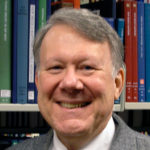Friday, March 17, 2017

Our Instructor
Tom Jones writes and speaks frequently on genealogical methods with broad application across geographic areas, time periods, and levels of expertise. He is known for meaty lectures benefiting genealogists of all experience levels. Audiences typically leave his lectures understanding that genealogical research can be more challenging than they had thought, but also that it can be much more fun.
Seminar Topics
Session 1: Developing Research Questions and Hypotheses; Planning an Exhaustive Search
Pinpointing what a researcher wants to learn about an ancestor; strategies for determining which records to consult and where to find them; planning research of sufficient scope to answer a genealogical question convincingly; issues in variety, breadth, and depth of research scope; looking beyond the record of interest; knowing when the obtained evidence is sufficient; re-planning and developing subsidiary questions when planned research is unproductive; incorporating research scope into case building and reporting; testing hypotheses; challenging your own conclusions with alternative hypotheses and expanded research scope.
Session 2: Correlating Sources, Information, and Evidence to Solve Genealogical Problems
Analysis and interpretation principles applicable to any kind of genealogical source; working with evidence from many sources; seeing patterns, parallels, and conflicts in evidence; working with records in a series (including censuses, tax rolls, rent rolls, city directories, communion lists, guardian and estate accounts); timelines, matrices, and other ways of graphically arranging evidence; explaining how records correlate and using correlation to build a convincing case.
Logistics
Date
Friday, March 17, 2017
- 12:30 PM-1:00 – Check-in
- 1:00-1:15 – Opening Remarks
- 1:15-2:30 – Session #1
- 2:30-3:00 – Break
- 3:00-4:15 – Session #2
Location
5th floor - Hamon Room
J. Erik Jonsson Central Library
1515 Young Street, Dallas, Texas 75201
- Get directions from Google Maps
- The Dallas Public Library website has information on public transportation.
Cost (Includes parking in the Library garage.).
| Member: | $40 |
| Non-Member: | $45 |
